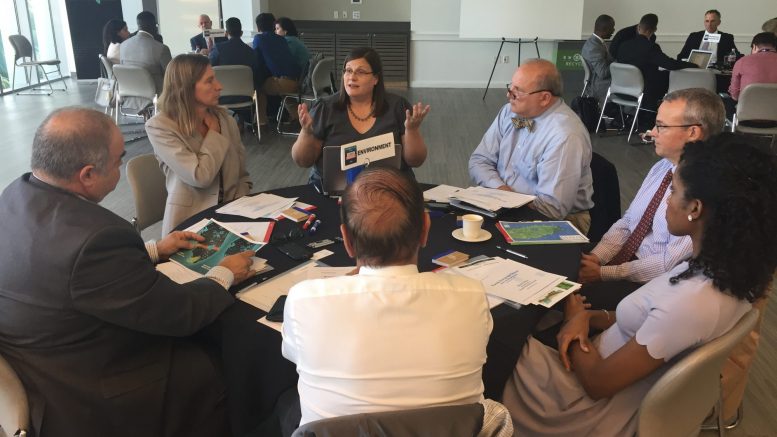By Michelle Marchante/Editor-in-Chief
Inconsistent communication and lack of awareness are just some of the reasons why Florida is in a “existential crisis” over climate change, according to environmental influencers who attended the first day of the Florida Priorities Summit at the University of Miami on Tuesday.
“Just like the Cuban Revolution took everything away, sea level and climate change will take everything away,” said Xavier Cortada, an artist-in-residence at Florida International University who is using his art to raise sea-level rise awareness.
Cortada is one of the Influencers participating in Florida Priorities, the two-day summit that is part of an ongoing project hosted by the Miami Herald, el Nuevo Herald and the Bradenton Herald. The series has used questions from readers and responses from 50 Florida experts from various disciplines to identify the key challenges facing the state.
He is also one of six environmental panelists in this year’s summit, along with Tiffany Troxler, director of science at FIU’s Sea Level Solutions Center.
Sea-level rise dominated the group’s discussion Tuesday afternoon as they tried to figure out why Floridians didn’t take the rising waters seriously and what they could do to change it.
The problem, according to Cortada, is that people look at things through an “economic prism,” and don’t realize that sea-level rise will affect them or their families in the future.
Fabiola Fleuranvil, CEO of Blueprint Creative Group, also said that information inconsistency is another layer of the problem, whether it’s between state entities or politicians. Julie Wraithmell, executive director of the Audubon Society and chair of the priority group, agreed.
“Everyone’s good with science when it’s easy,” Wraithmell said. “But everyone is shopping around for the science that is convenient [for them] when it’s not easy.”
David Mica, executive director of Florida Petroleum Council, however, defended the Legislature, saying that most of them want to do the right thing and that it’s important to recognize the progress that has already been made.
Despite small disagreements between Mica and Cortada, the group unanimously agreed that Florida needed to invest in green energy, increase educational awareness and have more media coverage of the environmental problems plaguing the state, such as red tide. However, Troxler said it’s not enough to just raise awareness.
“We need to go beyond the doom & gloom…have a singular focus on what can be done to solve issues,” Troxler said.
Finding a low-cost solution that doesn’t have negative results, however, is a challenge, according to Jorge Perez, chairman and CEO of Related Group, especially in an age of “instant gratification” where people want results immediately.
The red tide plaguing the state has drawn Floridians’ attention to their water, which is where it needs to be right now, Wraithmell said. That’s especially true if that attention can be drawn to the restoration of the Everglades, the largest ecosystem preservation project in the United States, she said,
“By recreating the wetlands, we make sure Florida is livable,” she said.
The panel will report their final decisions on the second day of the summit. Other priorities that will be discussed are education, health care, guns and infrastructure transport.
This article was originally published in The Miami Herald’s Florida Priorities blog.





Be the first to comment on "Florida in “existential crisis” over climate change, influencers say"